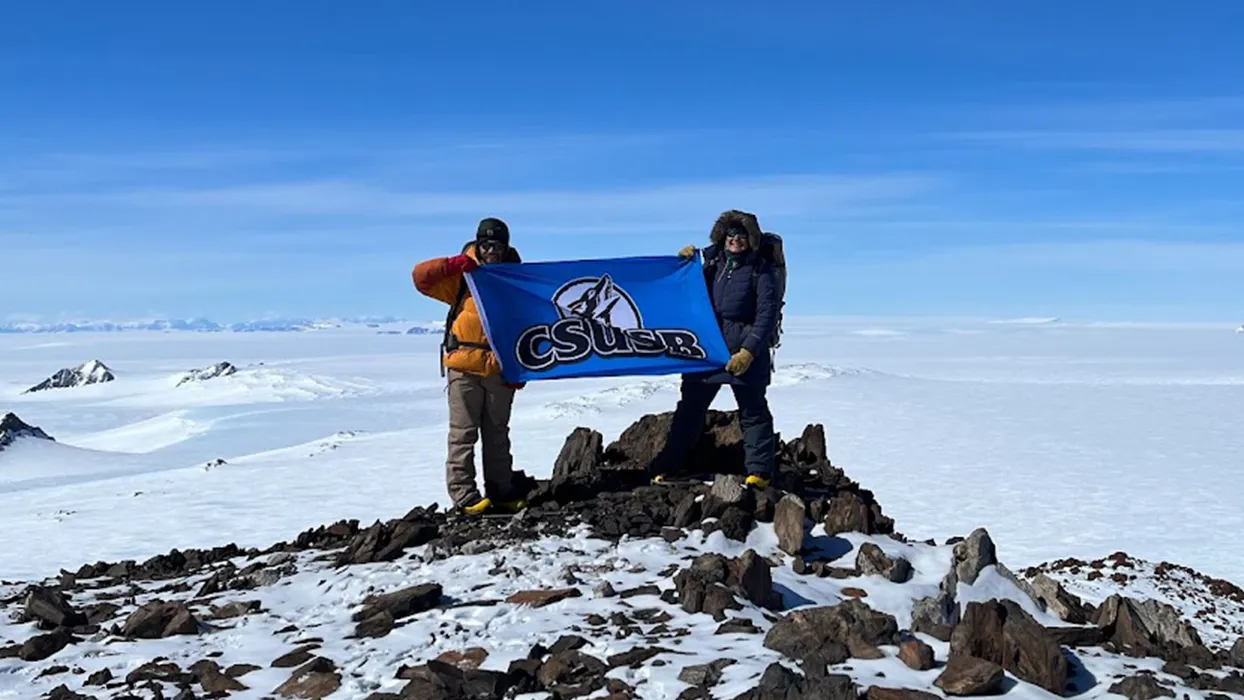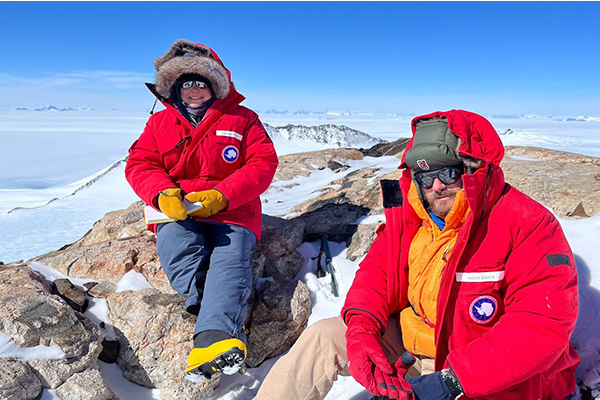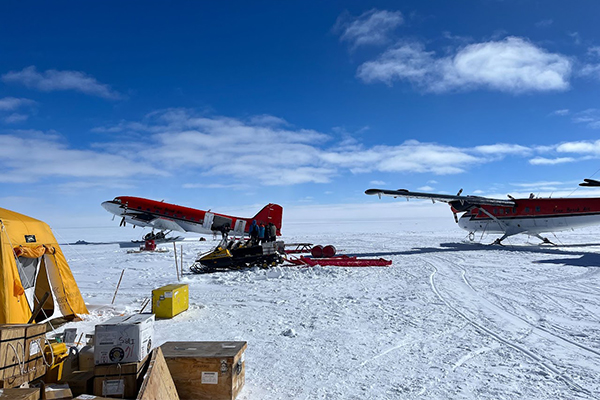Alan Llavore | Office of Strategic Communication | (909) 537-5007 | allavore@csusb.edu

A hallmark of studying at California State University, San Bernardino is the opportunity for students to undertake research with faculty members. This winter, the College of Natural Sciences’ geological sciences department assembled a team composed of a faculty member and two students to travel to Antarctica to undertake research on the loss of ice that makes up the East Antarctic Ice Sheet or EAIS.
Led by Claire Todd, professor and chair of the geological sciences department, graduate student Jacob Baker and undergraduate student Karina Ramirez made up the CSUSB team. Their mission was to investigate the EAIS, a region believed to have played a pivotal role in sea-level rise during periods of high atmospheric carbon dioxide. The National Science Foundation Office of Polar Programs funded the expedition not only to deepen our understanding of climate change but also to offer invaluable experiences to participating students.
"We are excited to provide well rounded training to our future leaders in science, and research abroad experience is one way we are having a positive impact on our students and our climate," said Sastry G. Pantula, dean of College of Natural Sciences. "We are proud of faculty like Dr. Claire Todd, who secure grant funding for research and for training our students."
For Todd, leading the expedition and witnessing her students thrive in such challenging conditions has been deeply fulfilling. She lauded the excellent preparation CSUSB students receive in their geology coursework, enabling them to work alongside seasoned scientists and Ph.D. students in one of the most extreme environments on Earth.
As she explained, “One of the most rewarding aspects of my job is sharing geologic research experiences with our students. Because of the excellent preparation students receive in CSUSB geology coursework, they are able to work effectively alongside Ph.D. students and other scientists to accomplish challenging geologic research in some of the harshest conditions on the planet!”

Preparation for the journey involved weeks of training at McMurdo Station, a hub on the fringes of the Antarctic continent. Instruction comprised how to use equipment for glacier travel, including snowmobile operation, crevasse-rescue techniques, cold weather safety and environmental protection. McMurdo also served as the expedition’s base of operations.
Living out of robust tents designed to withstand harsh conditions, the team used snowmobiles to reach nearby mountains, where they collected vital rock samples. These samples are expected to yield crucial insights into the pace of ice sheet retreat over time. While the 24-hour daylight was a fun aspect of the experience, their visit also involved grappling with a number of challenges. These included extreme cold as temperatures plummeted to approximately minus-20 Fahrenheit on some days, blowing snow, and low-hanging clouds that impacted visibility and hindered travel.
“This opportunity prepared me for field projects that involve working with multiple facilities and individuals most efficiently to get the project done,” said Baker. “Working as a group and with new individuals is a skill that can be applied to any career and will benefit me in my academic and professional career.”
These qualities, he believes, are invaluable assets in both academic and professional pursuits. “This project has broadened my academic and personal views of my entire life,” said Baker. “Majoring in geology can allow you to perform fieldwork in Antarctica and other areas far beyond SoCal. I have met several interesting people during my travels from all over the States, working on various scientific projects, and it has been amazing to see what work is done in Antarctica by the National Science Foundation.”
Ramirez, a geological sciences student pursuing a bachelor of science, expressed her gratitude for the opportunities afforded by her department. “I’m still an undergrad at CSUSB, so I never thought I would be able to travel and experience research to this extent,” said Ramirez. “I will forever be grateful to my geology department for preparing me and continually inspiring me to participate in these fantastic opportunities.”

She continues to process all that she saw, did and learned. “It’s amazing to feel like I’m acquiring experience and actively participating in scientific data collection that will contribute to future projects,” said Ramirez. “This experience is something I will never forget and will carry the skills and knowledge I have acquired with me for the rest of my academic and professional career.”
CSUSB has a long tradition of encouraging research opportunities for students, either under a faculty member’s supervision or as part of a faculty member’s research project. The university holds its own research competition each spring. This is the 38th year, it took place on Feb. 16. The winners from the competition go on to compete in the annual research competition involving other California State University campuses later in the spring.
An additional research symposium, “Meeting of the Minds,” occurs later in the spring on the campus. It comprises projects from across all five academic colleges. This is a newer initiative, celebrating 13 years on April 11. All these research opportunities are a proven tool in deepening student engagement with their degree work and encouraging them to persist through graduation. They also build memories that can last a lifetime.
The returning Cal State San Bernardino Geological Sciences team brings with them a wealth of knowledge, invaluable data and unforgettable experiences. Their contributions to the understanding of climate change and the history of the East Antarctic Ice Sheet will have impacts far beyond CSUSB. And for the students personally? Their education at CSUSB has allowed them to travel literally to the ends of the Earth to engage in research. That experience will transform their lives.
For more information on this extraordinary expedition and its impact on the CSUSB community, as well as the opportunities to study geology at CSUSB, please visit the CSUSB College of Natural Sciences and the Department of Geological Sciences websites.
For more photos of the expedition, visit the CSUSB Glacier Research webpage.